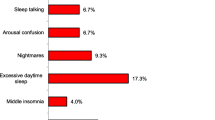Abstract
Background
Stroke is a life-threatening condition with many complications. Sleep disturbances is one of them. Sleep disturbances effect quality of life, recovery and rehabilitation process. It is crucial to reveal sleep disturbances objectively in stroke patients. The aim of the study is to determine reliability and validity of the Turkish version of General Sleep Disturbance Scale (GSDS-T) in stroke patients.
Methods
After translation and culture validation of the scale was done, Pittsburgh Sleep Quality Index (PSQI) and the Turkish version of the GSDS was applied at admission and at 24 h to the 58 patients with stroke.
Results
Cronbach alpha coefficient of total score was found as 0.850 and test re-test reliability-related Cronbach alpha coefficient was 0.785.
Conclusion
GSDS-T is a reliable and valid tool to assess sleep disturbance in stroke patients.
Similar content being viewed by others
Data availability
The datasets generated during and/or analysed during the current study are available from the corresponding author on reasonable request.
References
Khot SP, Morgenstern LB (2019) Sleep and stroke. Stroke 50:1612–1617
Asgedom SW, Gidey K, Gidey K et al (2020) Medical complications and mortality of hospitalized stroke patients. J Stroke Cerebrovasc Dis 29:104990
McDermott M, Brown DL, Chervin RD (2018) Sleep disorders and the risk of stroke. Expert Rev Neurother 8:523–531
Hermann DM, Bassetti CL (2016) Role of sleep-disordered breathing and sleep-wake disturbances for stroke and stroke recovery. Neurology 87:1407–1416
Titova OE, Michaëlsson K, Larsson SC (2020) Sleep duration and stroke: prospective cohort study and Mendelian randomization analysis. Stroke 51:3279–3285
Zhou L, Yu K, Yang L et al (2020) Sleep duration, midday napping, and sleep quality and incident stroke: the Dongfeng-Tongji cohort. Neurology 94:e345–e356
Buysse DJ, Reynolds CF 3rd, Monk TH et al (1989) The pittsburgh sleep quality index: a new instrument for psychiatric practice and research. Psychiatry Res 28:193–213
Buyukyilmaz FE, Sendir M, Acaroglu R (2011) Evaluation of night-time pain characteristics and quality of sleep in postoperative Turkish orthopedic patients. Clin Nurs Res 20:326–342
Ağargün MY, Kara H, Anlar Ö (1996) Pittsburgh uyku kalitesi indeksi’nin geçerliği ve güvenirliği. Turk Psikiyatri Derg 7:107–115
Lee KA (1992) Self-reported sleep disturbances in employed women. Sleep 15:493–498
Lee SY (2007) Validating the general sleep disturbance scale among Chinese American parents with hospitalized infants. J Transcult Nurs 18:111–117
Mollayeva T, Thurairajah P, Burton K et al (2016) The Pittsburgh sleep quality index as a screening tool for sleep dysfunction in clinical and non-clinical samples: a systematic review and meta-analysis. Sleep Med Rev 25:52–73
Ko H, Kim H, Kim Y et al (2020) Dose-response effect of daily rehabilitation time on functional gain in stroke patients. Ann Rehabil Med 44:101–108
Joa KL, Kim WH, Choi HY et al (2017) The effect of sleep disturbances on the functional recovery of rehabilitation inpatients following mild and moderate stroke. Am J Phys Med Rehabil 96:734–740
Seib C, Anderson D, Lee K (2014) Prevalence and correlates of sleep disturbance in postmenopausal women: the Australian healthy aging of women (HOW) Study. J Womens Health (Larchmt) 23:151–158
Galeoto G, Scialpi A, Grassi ML et al (2021) General sleep disturbance scale: translation, cultural adaptation, and psychometric properties of the Italian version. Cranio 39:326–334
Panuccio F, Galeoto G, Marquez MA et al (2020) General sleep disturbance scale (GSDS-IT) in people with spinal cord injury: a psychometric study. Spinal Cord 58:1183–1188
Iddagoda MT, Inderjeeth CA, Chan K et al (2020) Post-stroke sleep disturbances and rehabilitation outcomes: a prospective cohort study. Intern Med J 50:208–213
Sonmez I, Karasel S (2019) Poor sleep quality I related to impaired functional status following stroke. J Stroke Cerebrovasc Dis 28:104349
Akdeniz D, Em S, Caglayan M (2015) Determination of sleep quality and associated factors in stroke patients. Firat Med J 20:86–91
Funding
No funding was received for conducting this study. Reliability and validity of the Turkish version of General Sleep Disturbance Scale (GSDS-T) in stroke.
Author information
Authors and Affiliations
Corresponding author
Ethics declarations
Conflict of interest
The authors declare that they have no conflict of interest.
Ethical approval
Ethical approval for the study was agreed by the Ethics Committee of Başkent University (Date of acceptance: 09/12/2020; Project number: KA20/417).
Human and animal rights
The study including human participants has been performed in accordance with the ethical standards of the Declaration of Helsinki and its later amendments.
Informed consent
Informed consent was obtained from all participants.
Additional information
Publisher's Note
Springer Nature remains neutral with regard to jurisdictional claims in published maps and institutional affiliations.
Rights and permissions
Springer Nature or its licensor (e.g. a society or other partner) holds exclusive rights to this article under a publishing agreement with the author(s) or other rightsholder(s); author self-archiving of the accepted manuscript version of this article is solely governed by the terms of such publishing agreement and applicable law.
About this article
Cite this article
Bölük Şenlikci, H., Güzel, Ş. & Sözay, S. Reliability and validity of the Turkish version of general sleep disturbance scale (GSDS-T) in stroke. Acta Neurol Belg 123, 993–997 (2023). https://doi.org/10.1007/s13760-023-02191-4
Received:
Accepted:
Published:
Issue Date:
DOI: https://doi.org/10.1007/s13760-023-02191-4




